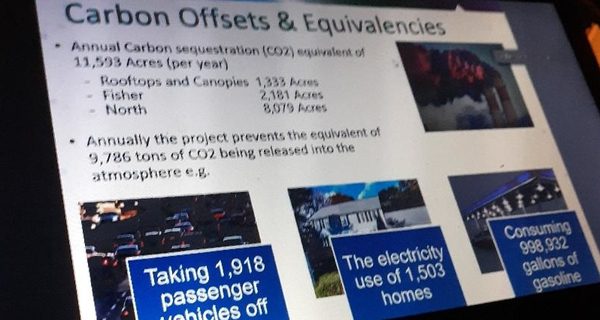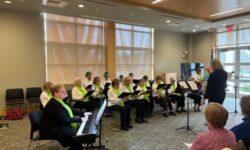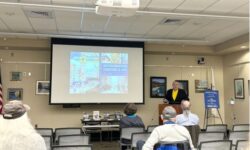One of the more interesting things about the debate is that it pits environmentalists against each other, debating whether cutting down forests to put up solar panels is the right thing to do.
By James Kinneen
Hometown Weekly Reporter
On Thursday night, Norfolk County had a public hearing to discuss the proposed solar panel project on both North and Main Streets. With well over 200 people watching remotely, and with comments from county residents lasting over two hours, the at times contentious meeting showed the passion all sides have about the project.
The meeting began with Norfolk County Commissioner Joseph Shea detailing some of the county’s financial needs, and the outline of when Walpole was made aware of the project. He then explained how the night would go, with Kearsage Energy’s Andrew Bernstein first giving a brief PowerPoint overview of the project and then those who had signed up to speak getting a chance to make their point. No questions would be answered, and people were asked to keep their comments to why they are in favor or against the project.
Bernstein noted that some of the Aggie’s roofs would need to be updated to hold any solar panels, that the carbon offset of the project would be equivalent to over 11,000 acres, that the topography of North Street will make the panels difficult to see, and that residents will potentially get cheap energy from the project. He also argued the Aggie could look into plants that could grow under the shade of the panels, that grazing livestock could keep the grass short, that the town would make money from the taxes and that they could potentially get some cheap energy. He also claimed the panels would contain “no toxic materials”, although some community commenters questioned this, including one man with 25 years’ experience in the energy industry who was quite concerned about the panels containing cadmium.
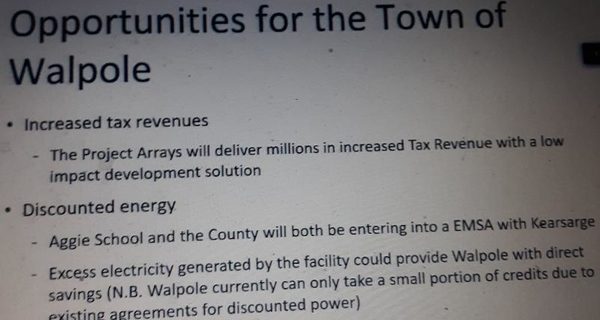
After Bernstein spoke, chaos broke loose. Microphones were not muted, so Bernstein was bombarded with harassment, with people yelling expletives at both him and Shea for not answering questions, for muting them, for disabling the Zoom chat function, and with one person going so far as to proclaim “all Andrew wants it money” and “you’re a disgrace, Andrew!”
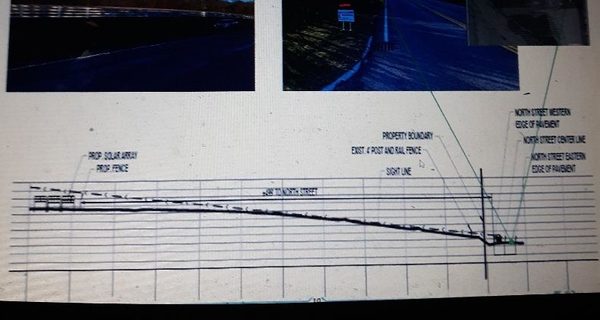
When order was eventually restored, State Senator Paul Feeney was the first to speak. Noting his “vehement opposition” to the project, Feeney argued that Norfolk Aggie is “the gem of Walpole”; that while he vehemently supports clean energy and cutting carbon emissions, the project “doesn’t fit”; and that “while the goals may be noble, the path to get there just doesn’t work with this project.”
State Representative Paul McMurtry was the next speaker, and also opposed the project. He wanted to wait until the COVID-19 vaccine comes out and everyone can meet to discuss the project in person. He also noted that “solar panels belong on rooftops”; that the project is “environmentally destructive”; and that we need to “find a mutually beneficent alternative.”
While there were too many speakers to note all of their issues, some arguments and counter-arguments came up often enough that they should be noted.
Among the Walpole residents who opposed the project, the idea that they approve of solar panels, but that these were not the places for them, especially due to having to cut down trees to put them there, was the most common refrain. One of the most commonly proposed solutions was that the panels could be placed on rooftops or at the old dump site.
Catherine Kennedy, who owns a horse farm along one of the proposed sites, noted the devastating impact the project would have, arguing that it would “destroy businesses, families, and what little green space we have left.” Many others pointed out the oddness of clear-cutting a forest to be more environmentally friendly. After noting that Shea lives in Quincy, Mike McManus sarcastically quipped that they should cut down seven acres of the Blue Hills to build the site, since it’s both closer to the sun and high enough already.
On the other end of the spectrum, supporters argued that putting it elsewhere is far from as easy as opponents are making it out to be, and that wealthy suburbanites have long devastated economically disadvantaged communities by being unwilling to take on aesthetically unpleasing, but energy efficient projects (for example, Cape Wind). Claire Galkowski noted that because of suburbanites’ consistent unwillingness to take on these types of project despite the sheer amount of electricity we use, in Everett, they are suffering more asthma and issues with COVID-19 because of the effects of the large generating station there. Virginia Ryan noted that putting solar panels on rooftops is far from being as easy as people think, that the old dump site is likely too contaminated and would create too many liability issues, and that it’s odd that “building developments never generate this type of opposition.”
Other supporters pointed out that while it seems odd, the solar panels would ultimately cut far more CO2 emissions, than the trees cut to make them would produce. Many argued climate change is an issue that needs to be addressed quickly, and that the project was good if you look at the bigger picture of the environment in general. Philip Czachorowski also pointed out that the trees the anti-solar-panel-project contingent is so strongly advocating for saving are already dying from diseases and drought, brought about by climate change.
Many of the project’s opponents felt especially insulted by some of the claims from Kiersage Energy they found obviously fraudulent. The company claims that at the end of the project, they will return the site to the way it was before. Frank McKenzie argues that even if it were possible to replace one hundred year-old trees, it was financially absurd to think a company on the way out of town after finishing a project was going to devote the kind of money it would take to restore the forest to the way it used to be. He also rejected the notion that wildlife would be unaffected by six foot chain link fences, a thought echoed by Rudy Barajas, who in response to the idea that the trails might be preserved rather than ruined argued: “When you’re on a trail and now there’s an eight foot chain link fence next to you, yeah, that trail’s been ruined.” Barajas, as well as a few others, also scoffed at the claims that the topography would make the panels nearly invisible.
Others took issue with the supposed financial benefits of the project. Sue Shocket claimed that her alternative revenue streams suggestions received no response from the county. Joseph Greeley claimed that the $200,000 being raised would be one percent of Norfolk Aggie's budget, and that all the money isn’t even going to the school.
As for potential legal challenges, environmental attorney Luke Legere came on the call and argued that he didn’t believe either zoning exception (Dover Amendment and Doctrine of Governmental Immunity) the county was citing applied to this case, and that with so many of their meetings being executive sessions, there was very much a question as to whether the proposal had been “developed behind closed doors” and had met the legal qualifications necessary. There were also questions about the Massachusetts Constitution’s Article 97 and whether or not it applied to this case.
A huge number of the comments came from Norfolk Aggie students (often accompanied by “Lorax” backgrounds) who talked about how much they loved the woods behind the Aggie, with Aggie mom Judy Parillo arguing that the forest “is the Aggie, and to destroy it would be to destroy the school itself.” Many students offered personal stories about classes the have had in those forests, and how it makes up one of the best cross country courses in the state.



